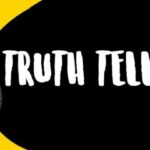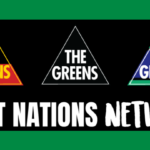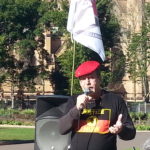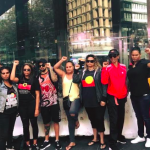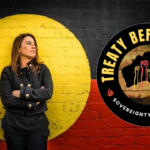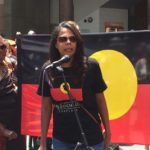If Not Then, Now: First Nations Justice Must Be Wrought via Treaties Based on Truth
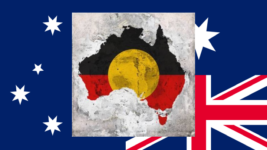
Racism is a foundational pillar of so-called Australia. Following its commencement in 1901, the first act of Australian parliament was to pass a series of white supremacist laws that together became known as the White Australia Policy.
The “fair go” notion that has always been attached to the nation only ever really applied to the white settler colonial population, and later to migrants who passed the white appearance test.
Indeed, right from inception, a “no go” Australia has been closer to the point, especially for First Nations peoples.
But Australia has also maintained a talent for hiding its true nature internationally. Perhaps, that’s to do with the pervasiveness of the founding legal fiction of terra nullius, that the land was empty of humans possessing distinct links to it, despite hundreds of nations existing here at that time.
The outcome of the Voice referendum, however, has shone a global light upon what’s really going on “down under” and the message is clear: a majority white settler colonial nation has voted against the Indigenous peoples of the land having a say in a system that impoverishes and criminalises them.
So, right now, as sound bites regarding the referendum reverberate around the planet, Australia is being classed in the global psyche alongside nations such as apartheid South Africa and the defunct Rhodesia, or in a more recent sense, the Israelis in Palestine and Indonesians in West Papua.
No gamechanger
The Albanese government was selling the Voice referendum as the be-all and end-all answer to deal with the atrocities that have taken place on this continent, which have resulted in the invaders becoming some of the wealthiest people on the planet and the First Peoples some of the poorest.
This solution, however, wasn’t going to address the injustices that commenced on invasion and continue until present day. The Voice was an attempt to alleviate the disparities First Peoples suffer under Australian institutions, but it was in no way going to attempt to dismantle them.
These institutions, such as law enforcement, the courts and the system of land ownership, were all established on this continent by the British colonisers at a time when that nation was in the midst of creating the largest empire the world has ever known and enriching itself through stolen resources.
At every possible moment he got during the campaign, prime minister Anthony Albanese stressed that the proposal wasn’t going to address any of these issues, as the Voice would not lead to self-determination via the establishment of treaties, and nor would it lead to reparatory justice.
The Voice itself was to be an advisory body to government regarding how the disparities between First Nations communities and the non-Indigenous might be improved. But unless this advice was taken up by ministers, the suggestions on advancement were simply to remain ideas put forward.
Telling the truths
The Australian Constitution was passed by the UK parliament in mid-1900, and it took effect on 1 January 1901. The document didn’t include First Nations people, except to say that parliament couldn’t make special laws for them and nor did it count them as part of the official population.
The Voice debate began as a conversation about constitutional recognition. And the Blak Sovereign Movement has always maintained that inserting Aboriginal and Torres Strait Islander people into the constitution would now serve to subjugate them to the state and legitimise their place in society.
Australia was established on a continent that the British claimed was free for the taking, despite hundreds of nations having dwelled here for at least 65,000 years, and right now, a third of this nation’s adult prisoners are Indigenous peoples who aren’t even a part of the founding document.
Constitutional recognition was first suggested by then PM John Howard in October 2007. This was one month after his government was one of four nations that voted against adopting the United Nations Declaration on the Rights of Indigenous Peoples (the UNDRIP).
The Blak Sovereign Movement has gained much traction over its last 50 years of agitating and the colonial government is well aware of this. And much of its momentum was steered into the Voice debate and now that proposal has failed it’s likely the government is hoping it’s all extinguished.
But the movement has been clear about entering the constitution and being placed in an advisory role regarding its own affairs as both being mechanisms that would serve to legitimise white rule over Indigenous peoples, relegating them to a position of asking their oppressors for assistance.
Treatymaking is different, however. Treaty is what First Nations people have placed on the table as their primary goal from the beginning, as such negotiations to establish treaties are made between sovereign entities over measures such as land and water rights and reparatory justice.
“The treaty has to be about peace. And it can’t be controlled by the oppressor,” said Senator Lidia Thorpe, whose been the most prominent voice of the Blak Sovereign Movement during the referendum campaign, although she’s by no means been the only one.
“A treaty is an agreement between two parties that have been at war. This treaty would be sovereign to sovereign, and it would be a negotiation about what clans and nations want on their own country,” she told Sydney Criminal Lawyers late last month.
Far from over
At every point along the way as he sold the Voice referendum to the Australian public, Albanese underscored that it was the one and only chance that the settler colonial nation had to right its wrongdoings of the past: genocide, dispossession, child removals and forced placement in camps.
But for those Yes voters who are lamenting a missed opportunity, and for those racist No voters who consider the entire issue to have been permanently settled, it’s time to realise that last weekend’s vote has resolved nothing and instead, it necessitates further immediate action.
As Thorpe has made clear all along, the Voice referendum is not the end when it comes to serving First Nations justice.
In fact, the Gunnai Gunditjmara and Djab Wurrung woman has remarked a number of times that the campaign and the costs around it have simply served as a distraction from ongoing First Nations injustice.
“There is a Plan B and its Treaty,” Thorpe posted on Monday. “We must look beyond the division that the referendum has caused and come together to demand the justice necessary to rebuild and nurture the strength and power of our communities.”


